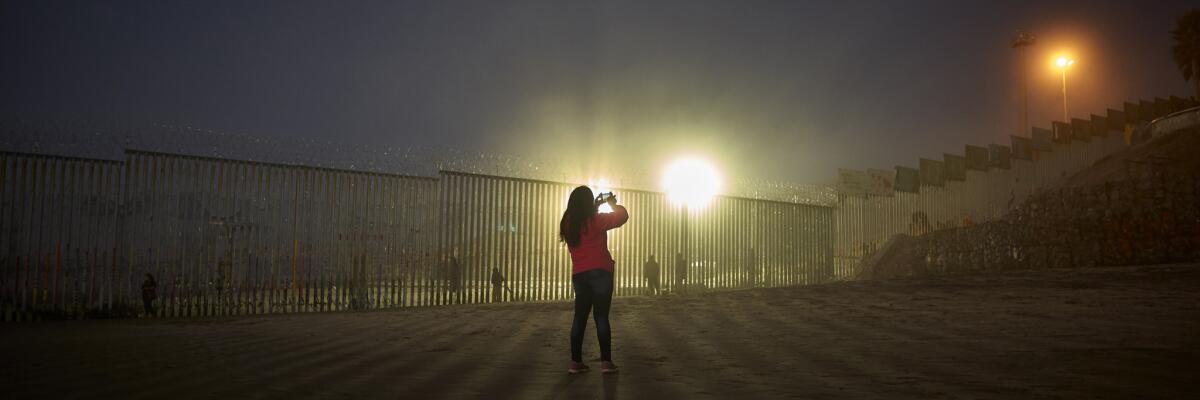Supreme Court agrees to rule on Trump’s immigration policies, but not until next year

- Share via
WASHINGTON — The Supreme Court agreed Monday to render a verdict on the legality of President Trump’s use of military funds to pay for an expanded border wall as well as his “Remain in Mexico” policy preventing migrants seeking asylum from waiting in the United States until their claims are heard, instead forcing them back to Mexico.
The justices said they would hear the administration’s appeal in both cases, Trump vs. Sierra Club regarding the border wall and Wolf vs. Innovation Law Lab on the “Remain in Mexico” policy. They set arguments for early next year, likely releasing a decision in June.
The pair of cases could prove highly significant if Trump is reelected next month. But they may well be dismissed if an incoming Biden administration revokes the disputed Trump policies, as the former vice president and Democratic nominee has pledged to do.
Trump’s hard-line policies on immigration have been declared illegal by federal judges in California. They said the president did not have the authority acting on his own to defy Congress and transfer billions in Pentagon funds to pay for building more border walls. And they ruled that the asylum laws did not authorize border agents to turn away migrants who asked for protection.
The administration lost on both issues in the 9th Circuit Court of Appeals in San Francisco.
But in both instances, Trump’s lawyers won emergency orders from the Supreme Court that allowed his policies to go into effect while the legal disputes proceeded.
In the meantime, thousands of additional asylum seekers have been forced back to Mexico, with many of the roughly 70,000 total put into the program waiting upward of a year in border cities that the U.S. State Department assesses as some of the most dangerous in the world. The administration has continued to push asylum seekers back to Mexico despite more than 1,000 documented assaults, rapes and kidnappings of those awaiting U.S. hearings under the policy, officially termed the “Migrant Protection Protocols.”
The administration has simultaneously been tightening border policies in response to the COVID-19 pandemic. It extended the closure of the U.S. Southern border to “nonessential” travel through at least Nov. 21, postponed many immigration court cases indefinitely and expelled at the border nearly 200,000 other migrants since March, including asylum seekers and unaccompanied children.
Border wall construction has continued, though paid for through the diversion of $15 billion in U.S. taxpayer funds and not Mexico, as Trump once promised. Most has been used to replace hundreds of miles of dilapidated and outdated border fencing. Trump has added only approximately 10 new miles of barrier where none existed before, according to the latest report from U.S. Customs and Border Protection.
The oral arguments at the Supreme Court would likely be scheduled for late in February.
Judy Rabinowitz, an American Civil Liberties Union attorney, said the Supreme Court should rule that the administration has been violating the asylum laws.
“Asylum seekers face grave danger every day this illegal and depraved policy is in effect. The courts have repeatedly ruled against it, and the Supreme Court should as well,” she said in a statement.
The Sierra Club had sued to halt the expansion of the border wall.
“The Trump administration has misused military funds for the construction of a wall that has caused lasting harm to the ecosystems and communities of the borderlands, damaged sacred Indigenous lands beyond repair, and destroyed wildlife and habitats along the border,” said Gloria Smith, a managing attorney at the Sierra Club. “Stopping this wasteful and irreversible damage is long overdue, and we look forward to making our case before the Supreme Court.”
More to Read
Get the L.A. Times Politics newsletter
Deeply reported insights into legislation, politics and policy from Sacramento, Washington and beyond. In your inbox three times per week.
You may occasionally receive promotional content from the Los Angeles Times.












